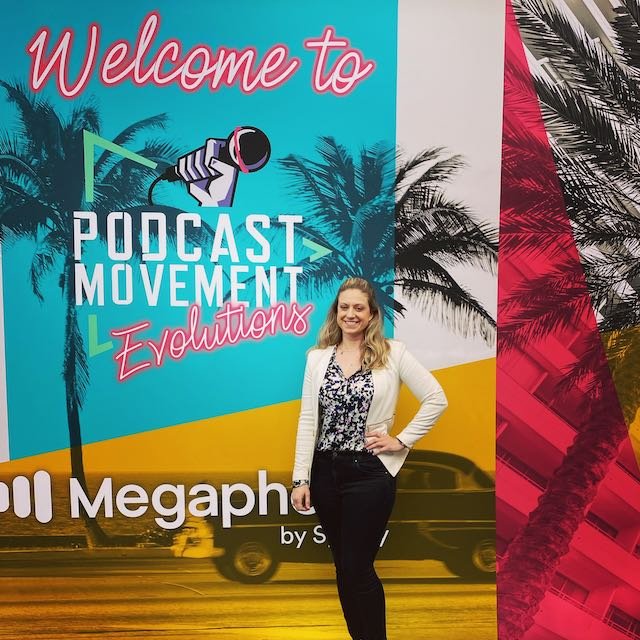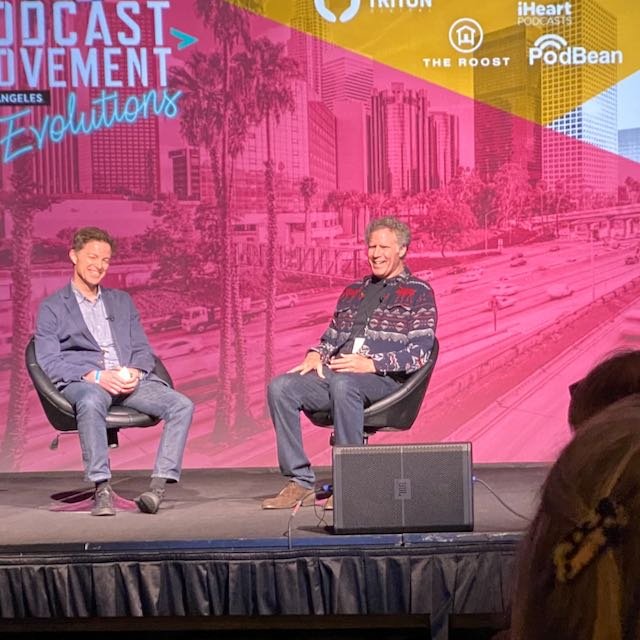Anti-FOMO: My Podcast Movement Evolutions 2022 Roundup
Two weeks ago, I attended the Podcast Movement Evolutions conference here in sunny Los Angeles. It was more socializing in 48 hours than I did in the previous 12 months, and I am still recovering. But it was worth it: I went to some great panels and sessions, I networked harder than Faye Dunaway, and it’s not every day you start with Will Ferrell before breakfast and end it on top of the Grammy Museum with Paris Hilton leading the crowd in a sing-along of “Don’t Stop Believing.”
I am 1000% serious:
Overview: Audiences are three dimensional people who engage with all kinds of products and media - not just podcasts. In my session, I explore how creative promotional partnerships can reach potential listeners who are passionate about your show’s subject matter and convert them into loyal fans, while adding value to your existing fans by introducing them to something new they will love.
Not only did I attend, I was a speaker! I did a virtual presentation on the benefits of podcast partnerships with apps, blogs, consumer products and digital media.
If you didn’t make it to the conference but are interested in my session, you’re in luck: I’ve made a cheat sheet you can download here. (If you did attend, you can still find my session on the event platform!)
Now, the good stuff! I went to Podcast Movement Evolutions both as a podcaster and a coach, looking for things I wanted to learn, try and teach. Here are some of my favorite themes and takeaways…
Lean into your strengths
Several speakers encouraged attendees to lean into their podcast’s strengths, regardless of audience size. It could be the quality or inventiveness of your show, a die-hard audience, or a strong mission. Jenny Kaplan and Shira Atkins of Wonder Media Network (who make one of my favorite pods, Womanica) spoke about how when they were starting out, they didn’t have the download numbers to support the business they wanted to do. Instead, they found champions who believed in their mission of uplifting underrepresented voices and were willing to invest in them. A good mission can go a long way these days.
Don’t leave money in the past
This is one for the evergreen shows: your library is VALUABLE. Pay attention to how many dl’s per month you get of your new episodes versus your older ones (for Every Day is a Food Day, about a third of our monthly downloads are of library titles). Dynamic content or platforms that allow you to swap sound files (like my fave, Buzzsprout) makes it easy for you to leverage your library in a couple of ways: first, if you have something current to promote – like new merch or a Patreon – you can insert CTAs for those things in older episodes so that anybody catching up on your show will hear about what’s going on in the present. The other is sponsorship. Don’t just focus on future episodes - if people are still listening to your earlier episodes, those are ad spots you can sell! Ca-ching!
Who are your “Podcast Friends”?
Marketing expert Lauren Passell is a big proponent of podcast promo swaps and collaborations (as am I!) In a panel about audience building, she dropped one of my favorite new terms. When thinking about the right podcasts to partner with, she says you have to figure out who your show’s “Podcast Friends” are. Who are their buddies? What other shows would your podcast want to hang out with? It gave me a delightful visual of different podcast logos on a swing set together.
Spikes vs. Growth
He’s kind of a big deal.
In that same panel, Rae Palermo of Megaphone warned against chasing “spikes” instead of growth. Spikes in download numbers are just quick hits that might be exciting - but growth is a long game that will sustain you.
The rest of us!
But y’all, it was Michelle Jackson who won the day for me with her session “Money for the Rest of Us,” addressing podcasters with fewer than 2,000 downloads a month - which is about 97% of them. Sick of the CPM model (aren’t we all?), she gave an epic list of ways she’s made money off her podcast without hitting those target numbers unattainable to most indie podcasters. Her ideas were killer: e-books, affiliate marketing, grants, crowdfunding, membership communities, consulting, do a special project or series within your brand and get sponsors, create a unique and low overhead product or other merch, selling stock photos! Some of these I hadn’t even thought of, and I can’t wait to try them out.
The dirt
In the interest of being real with you all, there were also some trends that I was not crazy about. Unfortunately, but not surprisingly, most of the content was about audience size and increasing downloads. I will save my rant for why treating download numbers as the highest measure of a podcast’s value is misguided, unhealthy and a creativity b*ner-killer for another day, and just say that that’s not where I personally think all the focus should be.
Also not surprisingly, all the suggestions for how to increase your audience size centered around marketing and promotion. There was basically nothing about trying to make a good show. Like, a show people would want to listen to. Which is my whole thing. It’s not the explicit focus of this conference, but still…it felt bizarre that most of the sessions were about growing your podcast audience with so little discussion of the podcast itself.
What do you think? Do any of these ideas grab you? Did you attend the conference and have more takeaways? Shoot me an email and let me know!




